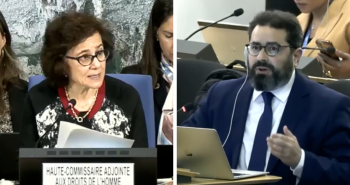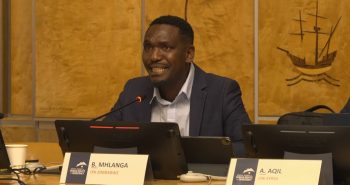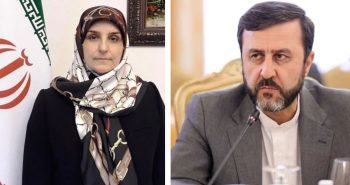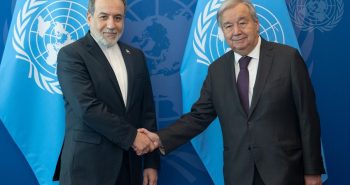Testimony at the UN
Oral testimony to the UN Human Rights Council, 8th Special Session
Delivered by Ben Albert, Dec. 1, 2008
Thank you, Mr. President.
UN Watch urges immediate action to protect the innocent victims of the Congo.
Civilians are being targeted by rape, looting, murder and other atrocities at the hands of government forces, rebels, and militias. Well over 250,000 civilians have been displaced, with 15,000 refugees sent fleeing to Uganda.
Let us recall that from 1998 to 2003, war in the Congo claimed the lives of 5 million people.
Any resolution adopted by this Council must include the following:
• One: the full reinstatement of the independent expert who was let go by this Council in March;
• Two: the dispatch of a fact-finding mission to investigate the gross human rights violations committed during the recent violence;
• Three: follow-up reports to this Council at all subsequent sessions, until the expert certifies that all violations have ended.
Morality also requires that we look back and ask: Could we have acted differently to save women from rape and children from murder?
In the March 2008 session of this Council, Mr. Titinga Frederic Pacere, the independent expert on human rights in the DRC, reported as follows: “…the lack of security remains worrying, especially in the regions in the east of the country, where militias and armed groups, as well as the Armed Forces of the DRC commit serious human rights violations with impunity.”
Citing examples, the expert gave specific warnings: “The incidence of acts of sexual violence continues to increase at an alarming rate… Pregnant women, persons in detention, minors and even babies are victims of individual or gang rapes, committed, to a worrying extent, by members of the Congolese national police and [the Congolese army].”
The expert urged this Council to “provide all necessary assistance to enable the independent expert to fulfill his complex mandate.”
In response, however, he was let go. The Council eliminated his mandate.
Tunisia spoke of “the positive developments in the human rights situation” in the Congo—indeed, “remarkable progress”—and criticized the expert’s report for not reflecting such “improvements”.
Egypt for the African Group said the DRC had an “environment conducive to the promotion and protection of human rights”; that “the mandate had not offered clear prospects for improving the human rights situation on the ground”; and therefore that “any renewal of the mandate would be counterproductive.” This was supported by Algeria, Russia and others.
Mr. President,
We must now ask: If the Council had heeded the reports of the monitor, instead of eliminating this early-warning mechanism, how many lives would have been saved?
And if the resolution before us today fails to reinstate the monitor, or to investigate the latest crimes, how many lives will be lost tomorrow?
Thank you, Mr. President.
Human Rights Council President replies: “I thank United Nations Watch for their statement and I just want to make a point here. Delegations, when they speak, should please aim to contribute to this debate and they should be forward looking in their statements. We do not need, I believe, to revisit the March session here. We do not have soothsayers here, nor prophets, so I would like our debates to focus on how we can move the situation in the DRC forward rather than cast blames for statements that have been made in the past. I just thought I should make this clarification.”





